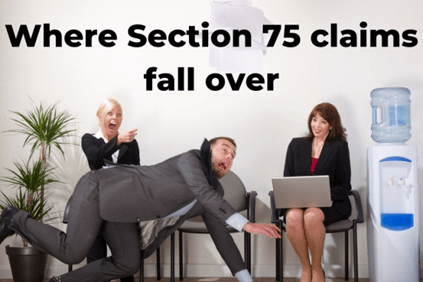When Section 75 let’s you down
Section 75 of the Consumer Credit Act 1974 is an incredibly powerful piece of legislation to protect consumers who used a credit card to make a purchase. Provided over £100 was spent on the card, but not above £30,000 then this legislation offers full protection in case something should go wrong.
Faulty goods, missing goods, breach of contract are all covered. If you paid £6,000 for a super TV and only paid £100 on your credit card with the rest being a bank transfer, it blows up and the supplier refuses to replace it, S75 covers you for the entire purchase price, not just the £100 deposit.
On the whole, S75 is a real consumer champion but it does have some very important areas where a claim will fail. Below we will look at the most significant problem area and how the scammers use this to their advantage.

The Debtor, Creditor, Supplier (DCS) link
This section of the S75 legislation is all important, in basic terms there has to be a connection between all parties. To explain:
- The Debtor – This is the card holder i.e. you
- The Creditor – This is the credit card company
- The Supplier – This is the person you paid for the goods or services
All three must be associated. Using our TV analogy above, if you purchased the TV from John Lewis then they are classified as the supplier. If your credit card receipt or statement shows any other name as the payee then under S75 a claim is likely to be rejected because the DCS link has been broken.

How scam companies use the DCS link to their advantage
A scam company may use a third party business generator. You are contacted by company A and they send you a contract for services and you pay them. When reading the contract the wording states that your case will be examined and if you have a claim or exit available company A will pass your details over to “a trusted third party” being company B, all good so far. When company B fails to deliver the expected results and you find you still own or worse there is no chance of a claim you naturally consider financial recompense. Having paid some or all by credit card this would appear to be a candidate for a S75 claim, but is it?
On the surface this should be a simple case but unfortunately it isn’t. Company B failed to do what was promised so you direct a claim towards them, unfortunately you didn’t pay company B you paid company A. If you then decide to claim against company A, their defence will be that they fulfilled the terms of their contract in as much as they didn’t contract with you to carry out any work themselves but they did do exactly as their contact stated, they introduced you to a “trusted third party”. Your card provider will state quite correctly that the terms of the contract were fulfilled. As far as company B is concerned you cannot claim against them as you didn’t actually pay them so the DCS link would be broken, a real catch 22.

Third party payment providers
Over the years it has become extremely difficult for companies to obtain credit card facilities, known as merchant accounts and so to offer clients the ability to collect payment by card. Organisations such as PayPal, PayXpert, Kliknpay etc who offer card payment facilities are becoming more common. Once again, the DCS link can cause problems. When paying a company for goods or services and they use third party payment providers, your credit card statement will normally show their name not that of the supplier. Whilst most third party payment providers have their own internal mechanisms should they receive a complaint, they are not covered by the Consumer Credit Act S75.
When S75 entered onto the statute books in 1974 there were no such third party companies in existence and as such are not covered by the law. Despite these possible obstacles we would still recommend that a credit card is used for at least £100 because even if the card company dispute the claim you still have the right to raise a complaint with the Financial Ombudsman Service, no such protection exists for either debit cards or bank transfers.

Final thoughts
This article highlights the possible pitfalls you could experience after the event. As usual carrying out your own research and due diligence before the event is all important prior to you signing on the dotted line and paying any monies. Our new mantra is hindsight is a wonderful thing but foresight is far more powerful as it will help to avoid you falling into a trap.
For more information regarding this article or assistance in any other timeshare related issues please contact the TCA on 01908 881058 or email: info@TimeshareConsumerAssociation.org.uk
